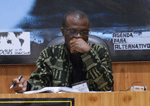Ghana: Economic Justice Network to deal with threats to livelihoods and jobs
Published on Tue, 2012-08-28 15:00
The Economic Justice Network (EJN), a Ghanaian coalition of civil society organizations working for socio-economic justice and equitable national development, was re-launched to deal with new policy threats affecting livelihoods, reported Ghana News Agency and AllAfrica news portal. Initially formed in 2005, the re-launch is part of the process to better position the Network in relation to current economic and development challenges and broaden the membership base. Tetteh Hormeku of Third World Network-Africa (TWN-A), said successive governments over the years had sought to deal with economic challenges confronting the country through reliance on foreign investors instead of building local capacities. Hormeku said that providing incentives to foreign investors has led to the abuse of the rights of Ghanaians and the denial of their livelihoods. The removal of import duty only helps to promote the foreign private sector at the expense of the national economy, he added while the EJN was re-launched last week in Accra. “All that we have succeeded in doing all these years is to pursue economic policies that privileges foreign private sector,” he said. Unless the country gets to be able to counter the pressure by foreign governments on national policies, the country would be far from achieving its economic development aspirations, according to Hormeku. The EJN helps civil society organizations to bring together their energy and expertise to deal with fundamental problems in the country’s economic policies, said the activist. “We should use our own knowledge, experience to formulate policies so it becomes a reference point to the struggle against bad policies,” he explained,. Ibrahim Alkabila, Coordinator of the Ghana Trades and Livelihood Coalition, said the current trend in which the country exports all its products in the raw form, does not augur well for national development. Global trade policies have all sought to perpetuate Africa’s position as a raw material base for the industrialized nations, and the World Trade Organization is rather serving the interest of the corporate world and not the developing countries, according to Alkabila. Home-grown protocols aimed to promote trade and development among the countries in the sub-region such as those of the Economic Community of West African States were not working because of the influence of external factors, he remarked. “Due to globalization, our government’s hands have been tied and Africa needs to be in line or else it will be pushed off,” he said. The Network has been at the forefront of advocacy on economic policy issues affecting Ghanaians, especially against the Economic Partnership Agreements, the planned free trade pact between European Union and Ghana as well as other African countries. The Ghanaian government has been asked by the EJN to stop making policies that favor the growth and profitability of foreign businesses at the expense of the local private sector which it often touts as the engine of economic growth. This national coalition of civil society organizations called on the government to change its policies that disproportionately promote foreign companies while Ghanaian companies and industries are offered lip-service incentives that do not help the growth and development of the local private sector. “Unless the country is able to counter the pressure from foreign governments on national policies, the country would be far from achieving its economic development aspirations,” the network warned With the motto “Food, Jobs and Income for All,” the new EJN brings on board a civic force to the economic governance of the country in the sense that it will act as a vehicle for conveying the needs and aspirations of ordinary people. The network emphasized the need for government to pursue economic policies which promotes indigenous companies to grow and create jobs that provide workers with living wages and salaries ̶ incomes that will trickle down to the ordinary Ghanaian. EJN believes that Ghanaians should use their own knowledge and experience “to formulate policies so it becomes a reference point to the struggle against bad policies”. Membership of the EJN is drawn from a wide range of non-state actors including trade unions, farmer’s associations, industry and services sector, professional groups, women's rights and equity bodies, faith-based institutions, students and youth groups and other non-governmental organisations (NGOs). Speaking at the launch, Fred Deegbe, Secretary General of the Christian Council of Ghana, observed, “the sad reality of years of economic growth is that majority of Ghanaians do not have jobs or decent means of livelihood. They do not have access to treated water, quality education, healthcare and housing.” Kofi Asamoah, Secretary-General of the Ghana Trade Union Congress, stated the re-launch marked the maturity of a process that has been developed behind the scene. Rising inequality and economic injustice, he regretted, were big challenges confronting the government and the masses. Re-launching the Network, Gyekye Tanoh of TWN-A, stated that the fundamentals of Ghana's economy, like many other African economies, remained extremely fragile after three decades of International Monetary Fund-sponsored uncontrolled liberalization, deregulation and privatization. These policies and models, Tanoh noted, have constrained and undermined the structural transformation of the economy to the detriment of ordinary Ghanaians. He observed that successive governments over the years had sought to deal with economic challenges confronting the country through reliance on foreign investors instead of building local industrial and entrepreneurial capacities. He said the provision of incentives to foreign investors had led to the abuse of the rights of Ghanaians as well as the denial of their livelihoods. Sources
|







